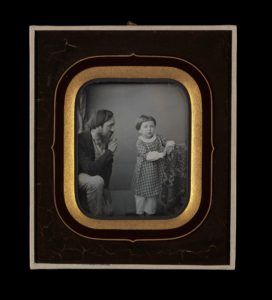California Bill No. 2826, introduced on February 20, 2020, by Assembly member Evan Low (D–Silicon Valley) would introduce a Part 2.57 on Gender Neutral Retail Departments in the California Civil Code.
Department stores with 500 or more employees would be required not to separate children’s clothing, toys, or childcare products on their selling floors, regardless of whether a product has been traditionally marketed for girls or boys.
Department stores failing to do so, and not correcting it within 30 days of receiving written notice of the violation from the Attorney General, would be liable for a civil penalty of $1,000.
Department stores selling children clothes would maintain “one, undivided area of its sales floor where… all clothing for children, regardless of whether a particular item has been traditionally marketed for either girl or boys, shall be displayed.” The same would go for toys.

Man Calming a Young Boy Posing before the Camera ca. 1850, Public Domain
Assembly Member Low explained in the press release that “clothing and toys sections of department stores that are separated along gender lines pigeonhole children. … [S]eparating items that are traditionally marketed for either girls or boys makes it more difficult for the consumer to compare products. It also incorrectly implies that their use by one gender is inappropriate.”
The California bill presents its purpose as being a practical one, as it is easier for consumers to shop if all children’s clothes are presented together on the sales floor, making it easier to compare products, but also to avoid stereotyping. Target removed gender-based signs in 2015 for its kids’ bedding and toy products. The retailer made that decision following a viral social media post.
Manufacturers are introducing gender-neutral lines for children. The concept is not new, as all children used to wear dresses, which was quite practical if a nappy quickly needed to be changed. As for a color to be assigned to a particular gender, boys sometimes wore pink and girls sometimes wore blue. Boys wore dresses.
Gender-neutral clothing lines for adult are also being launched. Now that women have gained the right to wear pants, gender-neutral clothes are pants or shorts, worn with shirts and ample sweaters. The ultimate gender-neutral clothing line would be men wearing skirts, as it is the norm for Highlanders. Jean-Paul Gaultier introduced the man-skirt in his Et Dieu Créa l’Homme collection, but the concept is still far from being mainstream.
No similar bill is currently discussed in New York. However, the State Assembly added last year a Section 145 to the Public Building Law requiring state agencies to ensure that all single-occupancy bathrooms under their jurisdictions are designated as gender neutral in state-owned buildings and, where practicable, in state-leased buildings. The law defines “single-occupancy bathroom” as “a bathroom intended for use by no more than one occupant at a time or for family or assisted use and which has a door for entry into and egress from the bathroom that may be locked by the occupant to ensure privacy and security.”
The justification for the bill was that “[g]ender identity is personal to an individual and not based on how the public views the individual’s appearance.”




